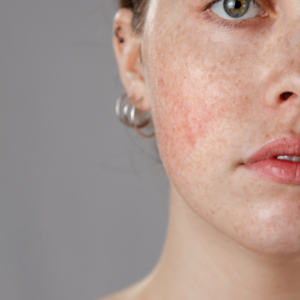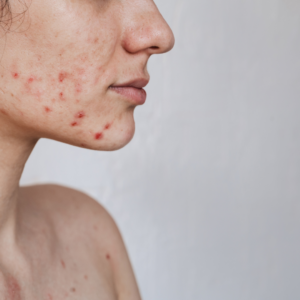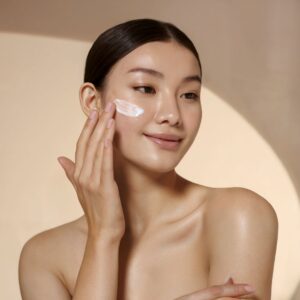
Rosacea Awareness Month: Signs, Symptoms & Treatment Options
Discover a youthful lift without surgery. Learn how our thread lift at Bryn Mawr Dermatology can rejuvenate your appearance.
Did you know that skin conditions affect an estimated 1.8 billion people globally at any moment? In tropical and resource-poor regions, skin infections, whether bacterial, viral, fungal, or parasitic, are the most prevalent cause of disease. Understanding the differences between contagious and non-contagious skin conditions is crucial for managing and preventing their spread. This article will review common skin conditions, identify contagious ones, and discuss various treatment options.
While this article spells out some important information about common skin conditions, we highly recommend you read the full article, here are the key points we will focus on:

Skin conditions are diverse and affect people of all ages and backgrounds. Here, we explore some of the most common ones and their underlying causes.
Caused by the human papillomavirus (HPV), warts are small, grainy growths that often appear on the hands and feet. They are contagious and can spread through direct contact with the wart or something that touched the wart.

This chronic autoimmune condition leads to the rapid build-up of skin cells, resulting in thick, scaly patches on the skin’s surface. It is not contagious and is often triggered by stress, infections, or cold weather.

Also known as atopic dermatitis, eczema is characterized by itchy, inflamed skin. It often develops in early childhood and can be triggered by environmental factors, allergens, or irritants. Although it may look like it, this red/purple rash is not contagious.

This viral infection causes firm, painless bumps on the skin. It is highly contagious and spreads through direct contact with the lesions or contaminated objects.

This condition results from direct contact with an allergen or irritant, leading to red, inflamed, and itchy skin. Common triggers include cosmetics, soaps, and plants like poison ivy. Although you can spread the cause of this skin irritant in some cases (i.e. if you have the oils of a poison oak plant on your skin or clothing you can transfer it to another individual) the rash itself is not contagious.

One of the most common skin conditions, acne is caused by clogged hair follicles from oil and dead skin cells. It can lead to whiteheads, blackheads, and pimples, and while it is not contagious, it is often linked to genetic factors in addition to hormonal changes, diet, and stress.

A chronic skin condition that causes redness and visible blood vessels in the face. It can also produce small, red, pus-filled bumps. Triggers include hot drinks, spicy foods, alcohol, and temperature extremes. Rosacea is not contagious.

This highly contagious bacterial infection of the skin usually starts as a cluster of red sores that eventually burst leaving a honey-colored crust over the area. It is found most commonly on the face, especially around the nose and moth and on the hands and feet.

This contagious rash caused by a fungal infection has nothing to do with worms, but is named as such because of the circular (ring-like) rash it creates on the skin. Symptoms are scaling, redness, and itching.

To manage and treat these conditions, it’s essential to first consult a skin specialist to identify the condition and receive personalized treatment.
While the symptoms themselves can’t definitively tell you if a skin condition is contagious, understanding the underlying cause can provide a clue. As a rule of thumb, if the rash is caused by a pathogen – a living organism that causes disease like bacteria, viruses, parasites or fungi – it will likely be contagious. Viral infections like warts, bacterial infections like impetigo, and fungal infections like ringworm are easily spread through touch or contaminated surfaces. Studies show a high prevalence of warts in people exposed to HPV, highlighting how contagious they are through skin-to-skin contact.
Conversely, conditions like acne, psoriasis and eczema are not contagious. Their origins lie primarily in genetics and how your immune system functions in addition to being influenced by outside factors of the non-living variety, like how hydrated you are or what you use to wash your skin. Research suggests a strong genetic link for psoriasis, with certain genes increasing the risk of developing the condition.
If your skin condition appears suddenly and spreads rapidly, it might be contagious. On the other hand, if it develops gradually and doesn’t spread to others, it’s likely non-contagious. However, using these guidelines is not a foolproof method; consulting a dermatologist is essential for an accurate diagnosis.
Effectively managing skin conditions requires tailored treatment approaches based on the specific condition and its severity. Here’s a breakdown of some common approaches:
Certain signs and symptoms indicate it’s time to seek professional help for your skin condition. Here are specific scenarios where a dermatologist’s expertise is essential:
Consulting with a dermatologist at Bryn Mawr Dermatology (BMD) ensures you receive specialized care and personalized treatment plans to address your unique skin concerns.
Skin conditions are incredibly common, and Bryn Mawr Dermatology is here to help. Our team of board-certified dermatologists leverages cutting-edge treatments to address a wide range of skin concerns. We go beyond just treating the physical symptoms; we take a holistic approach, considering the emotional impact that skin conditions can have on your life.
We utilize the latest diagnostic tools and treatment technologies to ensure optimal results. But most importantly, we believe in clear communication and patient-centered care. We empower you to participate in your journey to healthy skin actively. Schedule your consultation today! Our friendly staff can answer your questions and guide you towards achieving healthy, beautiful skin. Call us at 610-525-7800 or visit our website to book your appointment online. Let’s get you on the path to feeling confident and comfortable in your skin!

Discover a youthful lift without surgery. Learn how our thread lift at Bryn Mawr Dermatology can rejuvenate your appearance.

Discover a youthful lift without surgery. Learn how our thread lift at Bryn Mawr Dermatology can rejuvenate your appearance.

Discover a youthful lift without surgery. Learn how our thread lift at Bryn Mawr Dermatology can rejuvenate your appearance.

Struggling with acne scars? Discover the best dermatologist-approved treatments for smoother, clearer skin.

Looking to get your body summer-ready? Explore CoolTone and other expert treatments at Bryn Mawr Dermatology. Book your consultation today!

Looking to get your body summer-ready? Explore CoolTone and other expert treatments at Bryn Mawr Dermatology. Book your consultation today!

By: Bryn Mawr Dermatology, Published: July 12th, 2024
Medically Reviewed By: Christine Stanko, MD, FAAD – July 10th, 2024
For COSMETIC APPOINTMENTS:
For MEDICAL APPOINTMENTS: